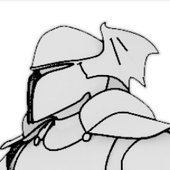It would be really nice if I knew how to draw. I need to spend a lot of time studying anatomy and such and trying different ideas. I think drawing/painting that would be faster and allow me to study more.
Unfortunately, I don't know how to draw although I've studied it just a little bit after enrolling in a 3D modeling art program.
As far as texturing, we are moving into an era where no one really draws or paints textures anymore. PBR is starting to become an industry standard and so texturing is done with programs like Quixel and
Substance. I've used both and I can't draw or paint to save my life. With both programs, you don't really texture by drawing or painting. In Substance, I do most of my painting with fill and masking. That's like painting in Photoshop with the bucket. Here is my DeviantArt page with some of my models on it:
All of those were "textured" with Substance. (The backgrounds are actual photographs.) I'm probably going to be posting a space ship interior that I've been working on for the past couple of month here in a couple of weeks when I finish it up. It used a lot more advanced techniques than anything I've posted so far.
And clothing for 3D games is starting to go to programs like
Marvelous Designer. For that you don't need to study painting and drawing; you need to study tailoring. A friend of mine was half joking when he said, "You're probably going to start seeing advertisements from game development companies that say 'Tailor Wanted!'". It's true. The industry is heading towards ultra-realism to the point that you need real world skills, rather than the ability to draw and paint.
Don't get me wrong, I have mad respect for those who have the ability to draw and paint. They are going to be able to do things I'll never be able to do, most likely. For one thing, they are in a better position to do more "artistic" looking art. Hyper-realism is something I tend to prefer. But some of the games that have really blown me away visually are the ones that go in the complete opposite direction and make something artistic or surreal.
Plus, for concept art, I think it's generally easier for them to draw and paint ideas faster than modeling them allowing them to just learn and explore more ideas in the same amount of time.
But personally, I'm such a beginner with painting and drawing that it's a very low priority for me to learn. I need to spend thousands and thousands of hours on it to get even reasonably decent at it. I could be spending those hours modeling (and learning how to tailor - lol).
Advice I might give (and keep in mind I'm still very much a beginner at this): get into an art program or find a mentor/teacher.
For me, I started out (after my previous life as a musician) as a programmer (well, I actually started programming at age 12, but I didn't really start understanding how to program 3D graphics until about roughly 8 years ago). I got into modeling just because it was difficult to find really great free models someone wanted to donate to my non-revenue generating code projects. And my modeling skills were horrible. Really bad. Non-existent. Although I had spent years learning 3D Studio Max from books and such and had been using Blender for a couple of years. I knew I needed to practice in order to get decent. But my models were the 3D equivalent of stick figure drawings. I mean check out
the intro montage to my YouTube channel because that has some of my models. Those were examples of coding projects I had done about 5 years ago. The nice looking car I got offline from someone else's tutorial (Riemers I think it was). The X-Wing, likewise was a download. And professor Zombie is a tutorial from a book that I went through. But like the block car and the horrible looking boat,
those were
my models.
I went from that to the stuff on my DeviantArt page in 6 months after I enrolled in the art program at Game Institute. A lot of that was because they push you to achieve more than you believe you can because if you had of asked me if it was possible for me to improve that much in 6 months, I would have laughed and said, "NO way!".
So, I think drawing and painting ability is useful and great for 3D artists, but my DeviantArt page shows what I've been able to do so-far without knowing how to draw or paint at all. I'm not the best 3D modeler out there. But those were all done after just being in an art program for 6 months and I continue to learn and get better every day.
Oh, I might also mention that I am about to publish a tutorial series on Blender on my YouTube channel "
VirtuallyProgramming.com". I've already recorded about 80 minutes and I'm going to record at least another 30 tonight after I finish this. So, I'm hoping to have an entire series published out there in about a week from now. It's going to be an introduction to Blender for absolute beginners where I walk through all the processes I use by modeling a kitchen table and explaining everything as I do it.
My previous videos have all been about game math and coding because the art thing is relatively new to me.







